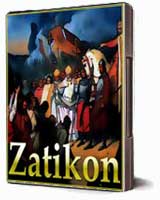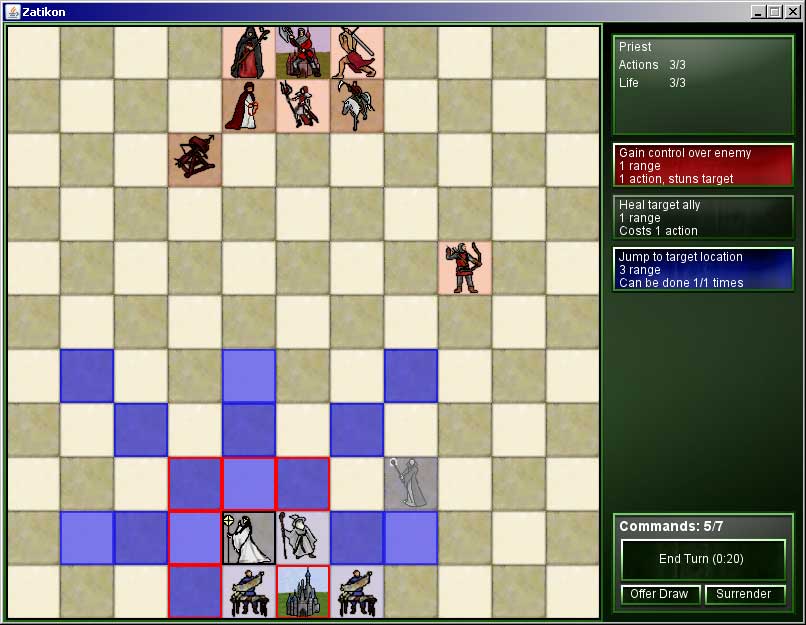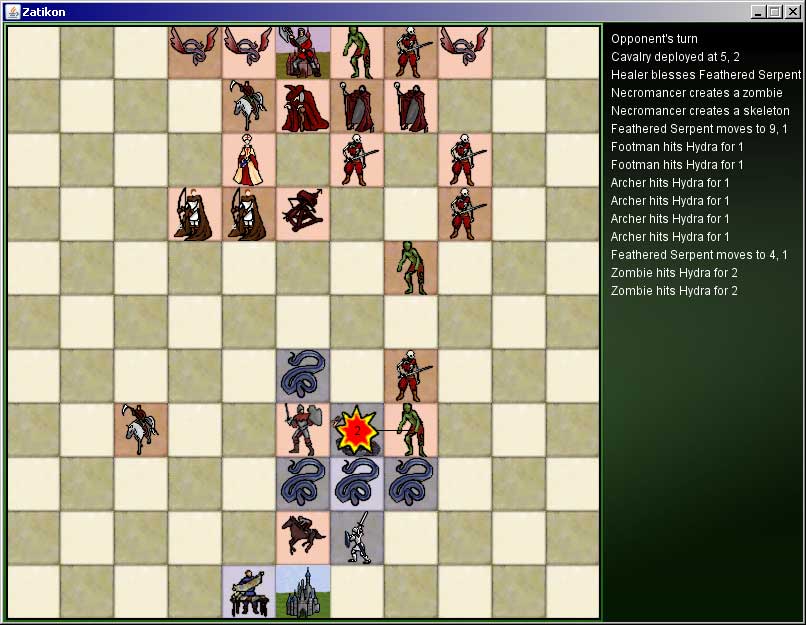 Zatikon is a turn-based strategy game from small indie developer Chronic Logic, who some of you might remember made an incredibly fun little bridge building simulator called Pontifex (later called "Bridge Construction Set"). The folks at CL are here to show they're not just a one-trick pony, however, as the two games are completely different.
Zatikon is a turn-based strategy game from small indie developer Chronic Logic, who some of you might remember made an incredibly fun little bridge building simulator called Pontifex (later called "Bridge Construction Set"). The folks at CL are here to show they're not just a one-trick pony, however, as the two games are completely different.
Graphics
Being an indie game developed in Java, the graphics of Zatikon are rudimentary. The playing field and all units consist of tiled images with only the most very basic of animation occurring during moves and attacks. It is clear a lot more time and energy went into planning the "inner workings" of the game than into the visual experience. That said, the units are all visually distinct enough to identify them by sight alone (once you learn what each unit is, of course), and the game does not exhibit any of the glitching or artifacts common to many simple 2D games. While they won't "wow" anyone, they won't annoy either. This also of course has the happy side effect of making the game playable on just about any computer that runs, not needing a powerful graphics card.
Sound
There's not much to the sound of the game, either. Aside from a few sound effects of clanging weapons, arrow strikes and the like, there's not a lot to the auditory experience and the game can safely be played on mute without jeopardizing much. There's some contemplative background music going as well, in the classical style, which does help punctuate that you're playing a thinking game, not a reflex game. Gameplay
Gameplay
Zatikon reminds me much of the strategy boardgames and wargames I would often play with my father and uncles at family gatherings in years gone by. It also throws in a bit of a collector card twist in that victories are rewarded with "gold" currency, which you can then use between games to buy new or additional unit types.
The game begins with a basic army and a tutorial which teaches you the fundamentals of play. The object of the game is to move one of your units into the enemy's castle tile, without allowing him to do the same to you. You start with some basic units of familiar configuration that allow you to get comfortable with how the game works before you worry about customizing your army.
Each "turn" of combat consists of you giving "commands" to your units. Some units can make more moves and attacks per turn than others, and depending upon your number of "commands" available to you and the size of your army, you may or may not have enough commands to move all of your units to their maximum potential. Players (or computers, if you're playing single player) take turns issuing all their commands until one side loses, surrenders, or both agree on a draw.
What really gives the game its replayability appeal is the ability to customize your army by purchasing units with the gold you earn from victories. To ensure balance between contestants, armies are limited in power to 1000 "points," with some units worth more points than others in a reference to relative strength. For instance, the "Ranger" unit is worth 200 points because he is a very powerful unit which costs no commands to use, gets many actions per turn and can attack from range as well as melee. For the same 200 points you could have 4 footmen or pikemen in your army, which depending upon your strategy may be more or less formidable. Once you have purchased a unit with gold, it is added to your deck, available for insertion into your custom army as you see fit to rearrange.
There are quite a number of unit options as well, affording a vast array of strategic options. The categories are Archers, Black Mages, Clergy, Commanders, Cultists, Horsemen, Nature, Scouts, Shapeshifters, Siege, Soldiers, Structures, White Mages and Wyrms (with multiple unit types under each category). Many units perform how one would expect given their names: Pikemen make good defensive melee units, Priests heal other units, Archer types generally do damage from a distance while being weak to being attacked themselves, and so on. Some also function as "wildcards," such as the "Possessed" cultist unit which has the fearsome ability to take control of any unit which kills it, the "Mimic" shapeshifter unit which can transform itself into a copy of any enemy unit on the field, or the "General" commander unit which gives you an extra command just for being deployed and reduces the command cost of deploying other units by 1. Each unit has its strengths and weaknesses, even if sometimes the only weakness is an extremely exorbitant point cost, such as the "Archangel" clergy unit which is a fearsome fighter, can instantly kill any unit which has killed another unit from any range, but costs a staggering 550 points... the equivalent of as many as 11 other units. Once purchased, a unit remains at your disposal until you decide to sell it back (for reduced gold, of course), even if you decide not to use it. You can reconfigure your army as often as you like, and you can save configurations for later loading convenience. There is also a random "buy unit" button which sells you a unit at an extremely discounted rate, though you have no control over which unit you will receive.
Once purchased, a unit remains at your disposal until you decide to sell it back (for reduced gold, of course), even if you decide not to use it. You can reconfigure your army as often as you like, and you can save configurations for later loading convenience. There is also a random "buy unit" button which sells you a unit at an extremely discounted rate, though you have no control over which unit you will receive.
You can either play against a computer opponent or other players. You are "ranked" by your record of defeating or losing to other players, and computer opponents do not affect your rank but still award you gold for defeating them. Defeating a computer opponent means the next computer opponent will be 1 order of magnitude more difficult, and losing to a computer opponent has no negative effect (other than decreasing the difficulty of your next computer opponent). Finding an online human opponent to play is very simple.
The basic game is free to download and play (you can also play the online version of the client here, which naturally requires the Java runtime environment to be installed on your computer). However, the free version does not grant access to all the units in the game, though you will still go up against them. Access to these other restricted units is granted through buying "expansions" for the game, which are $12 and $8 for the first two, respectively, with a third expansion on the way.
Conclusion
Despite being of modest appearance and production, Zatikon is very heavy on the strategy, particularly when playing against other players. I have to admit I was a little skeptical going in, as I'm not much of a turn-based game fan and I have a deeply-rooted animosity for the inherent problems of the Java programming language. However, my misgivings were for naught and the game is an intellectually intense contest of strategy and planning with unlimited replay value. I'd recommend it to any fan of strategy or war games, and since the cost to get your feet wet is zilch, you've got nothing to lose from trying it.
Grade: B
And that's the word from Bandit camp...




2 comments:
Service : Customer assistance ended up being exceptional. Lady on the phone possessed a good voice moreover My spouse and i have been given funding speedy.
Value :I personally have been given a good quality value as cash loan interest rates were incredibly inexpensive.
AAA Vancouver Payday Loans 310-4088 Cambie Street, Vancouver, BC V5Z 2X8 (778) 785-2087 payday loans vancouver
AAA Calgary Payday Loans 1014 Macleod Trail Southeast, Calgary, AB T2G 2M7 (403) 614-4637 payday loans calgary
AAA Ottawa Payday Loans 503 Avenue Gladstone, Ottawa, ON K1R 5N9 (343) 883-1422 payday loans ottawa
AAA Edmonton Payday Loans 10223 97 Street Northwest, Edmonton, AB T5J 0L5 (780) 669-1284 payday loans edmonton
I play this game alot, its a great game...
It has a very strong, though small, community that the developers listen to and fix any problem that arises.
Slow learning curve, but for those looking for a fun game to play for 10-30 minutes when you get a chance, its very fun.
Post a Comment